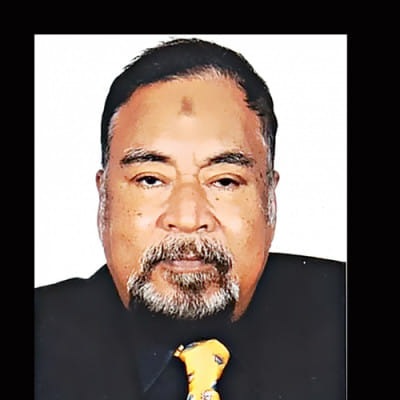Nur-E-Alam Siddique passes away

Nur-E-Alam Siddique, whose name is etched in the history of the nation's struggle for freedom, passed away early yesterday.
An organiser of the Liberation War, he was widely known as one of "four caliphs" -- the four key leaders of Swadhin Bangla Kendriya Chhatra Sangram Parishad, which was at the forefront of the non-cooperation movement in March 1971.
The former lawmaker breathed his last while undergoing treatment for old-age complications at United Hospital in the city at the age of 79. In the evening, he was buried at Zirani in Savar, near a mosque that was built with his fund, said Aniket Rajesh, his press secretary.
Earlier in the morning, his body was taken to his village home in Jhenaidah by a helicopter for his first Namaz-e-Janaza.
After the body was flown back to the capital, another Janaza was held at Gulshan Central Mosque after Asr prayers. The district administration of Dhaka also gave Nur-e-Alam Siddique a guard of honour.
A pall of gloom descended on the political arena as soon as the news of his death spread.
Prime Minister Sheikh Hasina, Speaker Shirin Sharmin Chaudhury, ministers, distinguished personalities, top leaders of different political and socio-economic-cultural organisations, including the Awami League and Workers Party of Bangladesh, expressed deep shock at his demise.
Born in Jhenaidah in 1944, Nur-E Alam left behind his wife, two sons and a daughter. His son Tahzeeb Alam Siddique is an Awami League lawmaker from Jhenaidah-2 constituency.
Nur-E-Alam Siddique, a student of Dhaka University, was one of the student leaders who spearheaded the struggles against the oppression by West Pakistan regime.
He took active part in the movement centring the six-point programme of Bangabandhu Sheikh Mujibur Rahman in 1966 and the mass upsurge in 1969.
Nur-E-Alam Siddique and his three comrades Shajahan Siraj, ASM Abdur Rab and Abdul Kuddus Makhon eventually became known as "four caliphs" of Bangabandhu.
On March 2, 1971, a massive crowd, mostly students, thronged Dhaka University defying curfew to witness a milestone event of history. In the presence of three others, Abdur Rab hoisted the flag of Bangladesh for the first time ever.
Nur-E-Alam, as the Chhatra League president, was the convener of Sangram Parishad.
The next day, the four leaders organised an event where Shajahan Siraj, read the manifesto for the country's independence. They also organised a national flag hoisting ceremony all over the country on March 23.
During the Liberation War, he was a member of Bangladesh Liberation Force (BLF), commonly known as Mujib Bahini.
After independence, Nur-e-Alam became the founding general secretary of the Awami Jubo League.
He was elected a member of parliament as a candidate of Awami League in the first national parliamentary election held in 1973 and served as the chairman of various parliamentary standing committees from 1973 to 1975.
He was also a member of the Bangladesh Constitution formation committee.
With the ruling Awami League tickets, he contested the 1996 and 2001 parliamentary elections from Jhenidah-2.
This veteran politician authored several books including "Awami League Birodhi Noi, Tabu Samalochona Kori", "Kaler Jayodwhani", "Itihas Akdin Kotha Bolbei," and "Sekaler Rajniti of Chhatra League".
A good orator, he was popular a face at different television talk-shows specially on political issues.

 For all latest news, follow The Daily Star's Google News channel.
For all latest news, follow The Daily Star's Google News channel. 



Comments